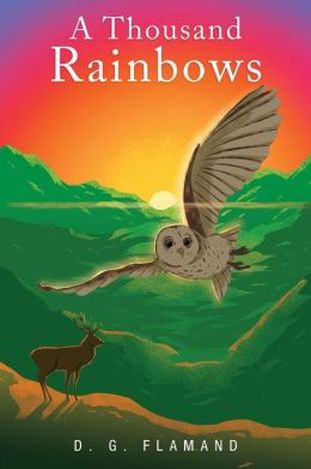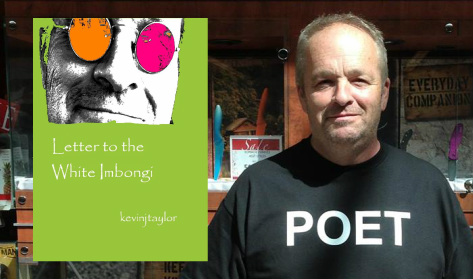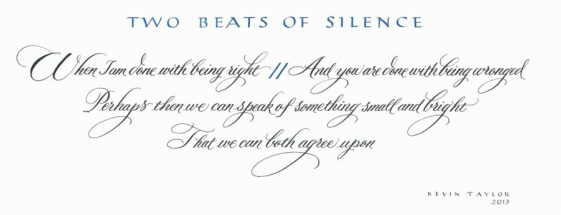 Having previously read three D.G. Flamand books, I was expecting “A Thousand Rainbows” to be like the others, positive, educational and inspiring. I had no idea what I was holding in my hands when I opened up the pages of this powerhouse of a book. It was everything his other books were, but more. I thought I was reading a children’s book but I quickly realized I was reading what I have no trouble calling, the most grown-up, mature book I’ve ever read in my life (and I’ve read a lot of books). Looking at the cover, an owl flying over a beautiful sunset, and reading the title “A Thousand Rainbows” I thought I was in for a pretty simple and straightforward story. As I started to read about the various animals that lived in the land of Cornucopia, “the most beautiful region of the world,” I wondered what was happening because it seemed as if nothing much was. In each new chapter I was shown a different group of animals, each happy, friendly and always positive. I kept waiting for some animal to say, “oh no! here come the bears, we have to run!” but none ever did. In fact just when I thought the bears must eat the fish if they didn’t eat the other animals, the story revealed that all of the land animals enjoyed talking to the fish in the river! What did the bears eat? Honey! Of course! Even though I’d read this author before (i should have known better), what I kept expecting was the usual dangerous, violent problem to arrive and strike fear into the story’s characters, but a lightbulb went on and I realized what D.G. Flamand was doing. Sometimes life rushes by and we don’t take time to smell the flowers. “A Thousand Rainbows” removes all of the stress, negativity and pressures of life and shows you nothing but the flowers. Some might say it’s “unrealistic” or “impossible” to have a place where everything is beautiful and everyone looks out for one another and the world is happy, but isn’t the job of the artist to paint a picture of a more positive future? Flamand’s world is a breath of fresh air because as he takes you from one group of animals to the next, you start to see that the world is bigger than one person and that we’re all worthy of some attention and care. Like I said, this book is for grown-ups because it’s so insidiously mature. The author’s touch is so light that any reader will gradually find himself a different person at the end and wonder how it happened. A casual glance at this book would never reveal the truth about it. In many ways it is a political and philosophical work on the level of George Orwell’s “Animal Farm,” only better because Flamand doesn’t have to resort to scaring you away from a dangerous path like Orwell and others have done. All he has to do is what a true artist would: create a bright, shining better path. This isn’t political rhetoric or wishful thinking or some doomed utopia presented in “A Thousand Rainbows,” it is an immensely powerful allegory with real solutions to real problems. It should be taught in every political science class. “A Thousand Rainbows” is a major work from one of the world’s most significant living creators. D.G. Flamand’s mission is to give the world non-violent literature and I think he’s a true visionary for actually doing it. Today we have “a thousand rainbows” but as his work finds a larger audience those rainbows will become immeasurable. To buy a copy of "A Thousand Rainbows" CLICK HERE. For everything D.G. Flamand go to dgflamandbooks.com
0 Comments
 Like the days of Homer, lyric tales have found their way to us, using words set to a rhythm, hitting us like waves playing against the shoreline. Poetry, when it is done best immortalizes the triumph of man over the elements, shouts the glory of the human spirit, and whispers the tragedies that blow across the universe like passing storms. The poet Kevin J. Taylor finds himself standing on a cliff at the edge of eternity, looking out across the vastness of space and with his book “Letter to the White Imbongi” building a bridge that carries us past ourselves, towards unimagined futures, leaving us back where we started, hopeful, wishful and oh so powerful. Taylor delivers a book that is spiritual to say the least, fixing the reader into strange, yet familiar situations, where they must look to the future, take in the past, notice every detail from an exterior view. Reading “Letter to the White Imbongi” is like being a child again and having your father lift you up and fly you across the house, except in the case of this collection of poems, we are taken into memories that feel more real than any room we flew across as kids. If the goal of art is to communicate, to move, then Taylor is a master, because he effortlessly maneuvers our thoughts and emotions, and the final result is a feeling that must be what astronauts experience because the world becomes smaller and we’re left to float across the cosmos like a giant kite. Traditionally, an Imbongi is the name-title of a Praise Poet. The word comes from South Africa but suits this Canadian born poet’s purposes extremely well. He is like the all-mighty and powerful Oz, except instead of standing behind the curtain, he’s at the crossroads of the universe with a bent ear, open arms and quickly moving hands, writing down the meaning of it all. From life to death and back again the story unfolds and drifts over landscapes. There is no leaf left unturned and Taylor manages to communicate the whole of existence with a few concise lines on a few, mostly empty pages. As one flips through the work, it’s hard not to notice the emptiness, or rather the vastness of available space. Kevin Taylor does in a few lines what most writers need thick volumes packed with words to communicate, and we’re all the better for the simplicity and the feeling of having plenty of room to move around in.
One day in the future we will look back at our lifetime spent doing the things we usually do with a lifetime, smile fondly and steady ourselves for the next voyage. Taylor’s poems make us feel like that, no matter where we are on this adventure called life. His poetry is in the tradition of The Odyssey because he dishes up an epic worthy to be sung and passed down, but perhaps is even more remarkable because he does it in about 20 pages. Get ready to fly to heights well worth the trip. Kevin J. Taylor will take you across eternity and stretch it even further. Enjoy the ride! For more information please visit http://poetkevinjtaylor.tumblr.com |
Michelangelo once said, "I saw the angel in the marble and carved until I set him free.” At Artists Run This Planet we see Earth as our marble and we hold a chisel and hammer up to it every day. This beautiful canvas of a planet waits for us to paint it daily. Gone are the days of suppressing art, of pursuits less noble than creating. We have the technology available to create in any medium, and faster than ever before. As artists we are the creators of every new innovation and idea that takes shape. We are mankind’s continual hope and driving force — “Artists Run This Planet." - David Carus, Art Planet CEO & FounderArchives
July 2016
Categories
All
|



 RSS Feed
RSS Feed
